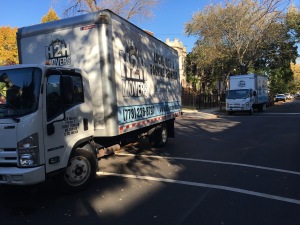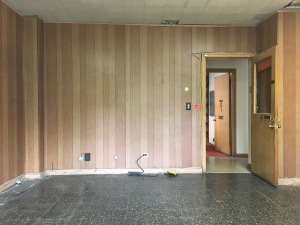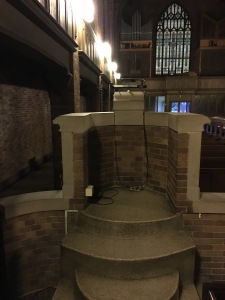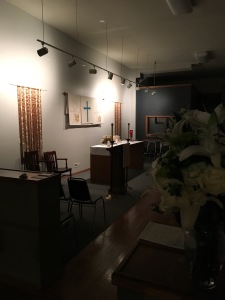Texts: Isaiah 25:6-9 + Psalm 24 + Revelation 21:1-6a + John 11:32-44
I think I have cried more in the last two weeks than I have in the last two years. Two weeks ago was the Sunday before our last Sunday in the old sanctuary. It was the Sunday we welcomed new members into our congregation; the Sunday we recognized Betty and Kay for their years of service to St. Luke’s; it was the Sunday Callie and Megan offered their stirring testimony to the ways our life together has strengthened and equipped them to live out their faith during times of radical change and deep loss.  As I stood in the back of the sanctuary singing the final verse of the sending hymn it suddenly hit me that we’d just finished our last “ordinary” service in that space. The following week, last week, was an extraordinary service: there were dozens of visitors and guests on hand to assist with our leave-taking, special music planned and prepared for the day, rites to help us release those spaces where we’d heard the word, felt the water, tasted the meal. It was extraordinary in every sense of the word, but the previous week had been extraordinary in its own way because it marked the end of our ordinary pattern of gathering for worship together in that space — and I only realized that after it was already over. That was the beginning of the tears.
As I stood in the back of the sanctuary singing the final verse of the sending hymn it suddenly hit me that we’d just finished our last “ordinary” service in that space. The following week, last week, was an extraordinary service: there were dozens of visitors and guests on hand to assist with our leave-taking, special music planned and prepared for the day, rites to help us release those spaces where we’d heard the word, felt the water, tasted the meal. It was extraordinary in every sense of the word, but the previous week had been extraordinary in its own way because it marked the end of our ordinary pattern of gathering for worship together in that space — and I only realized that after it was already over. That was the beginning of the tears.
I cried that afternoon, after everyone had left the building, and then I cried pretty much every day of the week leading up to our final service. I would be reading the lyrics of the beautiful piece the choir sang,
“we are not yet what we shall be … but we are moving toward it, the process is not yet finished. This is not the end, but this is the road”
and I would break into tears. I would be packing my office and run across a picture or a news clipping or a binder filled with minutes from some Council meeting almost a decade ago, and suddenly I would be flooded with memories of all the late nights, all the arguments, all the victories, all the moments of deepening friendship and trust built in that place, and I would begin to weep.
Looking back, our departure from the building that had been this congregation’s home for over a century was stunningly fast. We’d been talking about it for a few years, but once the decision was made the time from listing to sale to moving out was unbelievably short. Still, there were so many decisions to be made and so much work to be done that there was no time to linger with feelings. I had a brief period of melancholy right after the building sold, but then we were all focused on crossing items off our many, many to-do lists.
Last Sunday we got to the finish line and we said our goodbyes so gracefully, so lovingly. I was so proud of you, of us. We did a very hard thing, and we did it well.
 The moving trucks came the very next day and Gretchen and I watched as everything you’d spent the last three months packing was whisked away in just a few hours. Anything that wasn’t taken was hauled away as junk, and by Monday night the building was almost completely empty. It looked rough, like a strong wind had blown through the halls, leaving scuff marks and packing tape and leaves sucked in from the street. It looked like the emergency room of a hospital after the crisis has passed and the doctors and nurses have left, but before the custodians come in to clean. It looked like there had been a struggle between life and death.
The moving trucks came the very next day and Gretchen and I watched as everything you’d spent the last three months packing was whisked away in just a few hours. Anything that wasn’t taken was hauled away as junk, and by Monday night the building was almost completely empty. It looked rough, like a strong wind had blown through the halls, leaving scuff marks and packing tape and leaves sucked in from the street. It looked like the emergency room of a hospital after the crisis has passed and the doctors and nurses have left, but before the custodians come in to clean. It looked like there had been a struggle between life and death.
Tuesday afternoon the cleaners came. They dusted the pews, they swept and mopped all the floors. They took their time with it. I thought of that woman who’d knelt at Jesus’ feet anointing them with oil before he died. Something lovely before the grave. Then they left, and I was alone in the building.
 With the final walkthrough scheduled for 9am the next morning, this was my last chance to say goodbye to our home. I took my time with it, walking through each room and remembering the stories you’d told me over the years that filled those spaces. The Sunday School classes you have taught. The high school dances back in the old loft. The spaghetti suppers in the hall. I stood in the Lesher Lounge, emptied of all its furniture and remembered that board room table so many of us have spent long nights sitting around, wondering where the money would come from. I passed through the offices, hearing your voices again as you told me you were getting married, going through a divorce, leaving for school, worried about your children, searching for work, grieving the death of your loved ones, questioning your faith, and I wept.
With the final walkthrough scheduled for 9am the next morning, this was my last chance to say goodbye to our home. I took my time with it, walking through each room and remembering the stories you’d told me over the years that filled those spaces. The Sunday School classes you have taught. The high school dances back in the old loft. The spaghetti suppers in the hall. I stood in the Lesher Lounge, emptied of all its furniture and remembered that board room table so many of us have spent long nights sitting around, wondering where the money would come from. I passed through the offices, hearing your voices again as you told me you were getting married, going through a divorce, leaving for school, worried about your children, searching for work, grieving the death of your loved ones, questioning your faith, and I wept.
 Then I walked down those back stairs from my office to the sanctuary. It was night by then so I turned on the lights and listened to my footsteps echoing through that cavernous room. I climbed up in the pulpit one last time, feeling grateful that I got to learn how to be a preacher in that place. I laid my hands on the altar and remembered the deep honor it had been to preside at the Lord’s Supper in that sanctuary, to get to sing in a room that sang along with us. In the quiet dark I chanted the liturgy one last time, “The Lord be with you…” and listened to my voice echo back to me.
Then I walked down those back stairs from my office to the sanctuary. It was night by then so I turned on the lights and listened to my footsteps echoing through that cavernous room. I climbed up in the pulpit one last time, feeling grateful that I got to learn how to be a preacher in that place. I laid my hands on the altar and remembered the deep honor it had been to preside at the Lord’s Supper in that sanctuary, to get to sing in a room that sang along with us. In the quiet dark I chanted the liturgy one last time, “The Lord be with you…” and listened to my voice echo back to me.
 I sat down in the cathedral chair where I’ve sat for the last nine years and spent the next forty minutes in prayer. When my thoughts finally turned to plans for this morning’s worship, I knew I’d begun to move on and that it was time to go. Walking one last time down that center aisle, I saw you in your usual places. There’s Bev, in the pew behind the piano so she can get to it quickly. There’s Katie near the aisle. Hope is three pews in on the left; Charles and Marco used to sit in front of her. Dea and Betty across the aisle to the right, with Bill and Judi just behind them. A couple rows back is where Ben and Heather used to sit, with Scott and Kenneth toward the side aisle. Closer to the back Justine has slipped in next to Christa and Kerry, who’s ready to slip out. Behind them in the back corner are Pat and Dorothea, and on the very back pew — the one with the little brass placard designating it for the “men of the usher board” — are Iván and Victoria and Níco, or Cathy and Alex along with Soli, Isaiah and Hanna. Standing inside the frame of the back door I look down and see Eugene sitting there, and I check reflexively to see if there are offering plates for the ushers. Then I cry some more.
I sat down in the cathedral chair where I’ve sat for the last nine years and spent the next forty minutes in prayer. When my thoughts finally turned to plans for this morning’s worship, I knew I’d begun to move on and that it was time to go. Walking one last time down that center aisle, I saw you in your usual places. There’s Bev, in the pew behind the piano so she can get to it quickly. There’s Katie near the aisle. Hope is three pews in on the left; Charles and Marco used to sit in front of her. Dea and Betty across the aisle to the right, with Bill and Judi just behind them. A couple rows back is where Ben and Heather used to sit, with Scott and Kenneth toward the side aisle. Closer to the back Justine has slipped in next to Christa and Kerry, who’s ready to slip out. Behind them in the back corner are Pat and Dorothea, and on the very back pew — the one with the little brass placard designating it for the “men of the usher board” — are Iván and Victoria and Níco, or Cathy and Alex along with Soli, Isaiah and Hanna. Standing inside the frame of the back door I look down and see Eugene sitting there, and I check reflexively to see if there are offering plates for the ushers. Then I cry some more.
Our lives are filled with spaces where the living and the dead, the present and the absent, meet. At this time of year in particular we are sensitive to the grief of loved ones who will not be with us for Thanksgiving or for Christmas. Some are removed from us by distance or by conflict, others have died and their absence is as real as the person sitting next to us. We are people filled with tears, people with so many reasons to weep. Even if her words aren’t our own, we understand the sentiment, the pathos, behind Mary’s painful accusation, “Lord, if you had been here, my brother would not have died.”
So often when we speak of God, we speak of life. We focus on the miracle stories where Jesus heals the blind and raises the dead. It creates in our imaginations a false parallelism between good and evil, life and death. Death itself, however, is not evil or a sign of God’s absence. Death is the price of living, it is an integral part of the gift of life. God, who creates all that is out of nothing, is not confined by death. Instead, in Jesus, God demonstrates a passionate solidarity with all the pain and mess of life and death. God does not skip over the hard parts, the heartbroken parts, or the painful parts. God does not avoid the questions grief asks. God can take the anguish and the anger behind all our “whys.” Why does everything change? Why did we have to leave? Why have things turned out so differently than we planned? I was going to be buried there. We were going to be married. He was going to be a grandfather. Lord, if you had been here …
Jesus’ response to Mary’s hard words is not to take them away from her, but to join her in her grief. The translation we’re given is far too tepid, “he was greatly disturbed in spirit and deeply moved,” keeping Jesus somehow stately in the middle of this moment of suffering. The Greek suggests something more like, “he churned with anger and anguish.” In Jesus, God has an entirely human response to the death of his friend Lazarus. He is distraught, and he weeps.
Even when Jesus raises Lazarus from the dead, it is not a repudiation of death. Jesus does not put an end to dying. Scripture doesn’t suggest that Lazarus won’t go on to die again. Jesus himself explains that this sign is intended to stir belief. Instead of denying death, this sign is intended to demonstrate that our God is the God of the living and the dead. That there is no state of being, neither life nor death, that can separate us from the power and presence of God. Having raised Lazarus from the dead, Jesus will next go to his own grave. Death is not to be feared, but grief is real and must be embraced. So Jesus weeps.
 Friends, we have been working very hard for a very long time. Now we have arrived at the first of what may be a series of interim locations on the way to whatever our future holds. There will be new challenges in the new year, because that’s simply what it means to be alive. We are constantly being changed. But now it is time for a season of rest. Now is the time to turn towards one another and weep with those who weep, to rejoice with those who rejoice. Now is the moment when our memory and our imagination come together so that we can still see the faces, remember the names, hear the stories. Now is the time to worship God, who holds our past in trust and prepares our futures with hope. God, who does not abandon us in times of sorrow, but joins us in weeping, and gently wipes away our tears.
Friends, we have been working very hard for a very long time. Now we have arrived at the first of what may be a series of interim locations on the way to whatever our future holds. There will be new challenges in the new year, because that’s simply what it means to be alive. We are constantly being changed. But now it is time for a season of rest. Now is the time to turn towards one another and weep with those who weep, to rejoice with those who rejoice. Now is the moment when our memory and our imagination come together so that we can still see the faces, remember the names, hear the stories. Now is the time to worship God, who holds our past in trust and prepares our futures with hope. God, who does not abandon us in times of sorrow, but joins us in weeping, and gently wipes away our tears.
Amen.